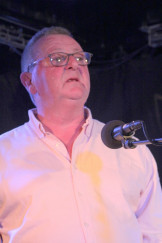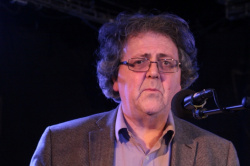The three Dooleys: poetry siblings Tim, Maura and Terence read together in public for the first time

The Troubadour in west London has seen a number of historic poetry and music nights in its time – but this was a new first. Three poetry siblings - Terence, Tim, and Maura Dooley – reading together in public, anywhere, for the first time.
Coffee-House Poetry’s organiser, Anne-Marie Fyfe, suspected it was a world first. She mentioned the Bronte sisters, but of course they never read in public together, and didn’t concentrate on poetry, anyway. There were also the 20th century Sitwells – Edith, Osbert and Sacheverell – who published themselves in their own Wheels anthologies, along with other poets, between 1916-21. But Wikipedia is unable to confirm if they ever read at the Troubadour.
On Monday night Terence, Tim and Maura performed a kind of “sibling symphony”, taking turns to read without introductions, either poetic or autobiographical. By way of explanation, Tim Dooley has previously said: “I suppose it hasn’t been particularly odd to us that we’ve all written poems.

Tim has also said that all three “continue to take pride and pleasure in each other’s work”. That was clear from the chemistry on stage, a case of sibling revelry, to borrow a rather elegant way of describing it, as different themes were picked up through the reading.
Tim Dooley’s ‘Out’ traced a journey of escape through the Home Counties out to East Anglia and the north Norfolk coast, where the seals “swivel and swim between sand bank and Artic sound”. The song of the seal was immediately echoed in Terence’s ‘Blue Moon’, followed by Maura’s ‘Still Life with Sea Pinks and High Tide’, with its message to those that will listen that “Our melting, shifting, liquid world won’t wait / for manifesto or mandate, each / warning a reckoning.”

That restless sense of quest took Tim to ‘Jutland’, in search of Seamus Heaney’s Tolllund Man, while Maura ironically quoted Dr Johnson’s apparent praise of Streatham, which was probably much more pleasant back then (‘At Streatham Hill Station’). Terence conjured up the complications of differing seasons in northern and southern hemispheres and “upside down” Uruguay, and imagined a fleeting meeting, not on Skype, but as “our flight-paths cross”, somewhere out over the ocean.
Maura Dooley’s ‘Cleaning Jim Dine’s Heart’ was shortlisted for the Forward prize for best single poem. This was imaginatively followed by Tim’s ‘Taking Down the Statue’, about an equestrian statue in a London square of the notorious “butcher of Culloden”, the Duke of Cumberland, that was torn down after his reputation took a deserved nosedive, and later recreated in soap, which is gradually disintegrating, in a slow-motion repeat of the duke’s previous fall from grace.

Afterwards Anne-Marie Fyfe praised the “links, connections and personal geographies” revealed by the poetry siblings, who she had earlier said sounded rather like a family high-wire act - the Flying Dooleys, perhaps. Their poetry balancing act – both Tim and Maura reading from recent new collections, as well as Terence - certainly resulted in resounding audience applause at the end of a very entertaining set.
In the first half of the evening a number of Faber Academy poets performed single poems with great aplomb. There were a wide variety of subjects, including two poems about objects – Katy Mack’s umbrella with a parrot’s head, and Andy Ball’s downbeat ‘Jug’: “Inspire me, be my Grecian urn!” And who among his listeners could forget Paul Crichton’s series of admonitions, including this one: “Don’t believe what people say. It’s not fair to them.” Sound advice, indeed.
Greg Freeman




